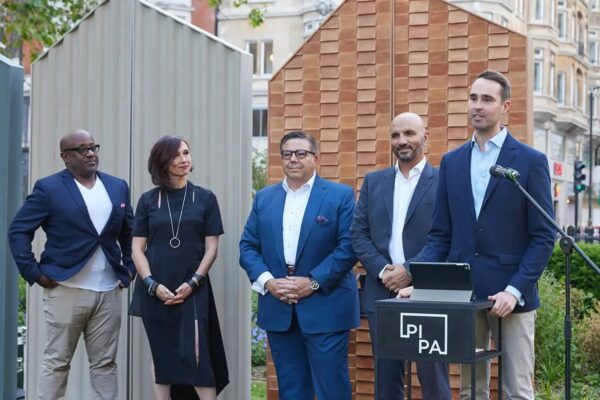The Porcelanosa International Project Award (PIPA) celebration took place in Hanover Square, London, on 8 June.
Hosted by British real estate specialist, journalist and presenter Kunle Barker, the event served as a platform to highlight achievements in architecture and interior design from around the world.
The event brought together industry professionals and design experts. Their shared passion created the right atmosphere for an unforgettable evening.
Celebrating Architectural Excellence
After an intense week of professional meetings and experiences, the PIPA awards culminated with the awards ceremony. The projects were presented to the jury the day before, in the lead-up to the eagerly awaited ceremony.
Hanover Square became a hive of creativity and artistic expression, where guests could not only admire the finalist projects competing for the awards, but also enjoy an atmosphere infused with vibrant greenery and inviting live music.
PIPA 2023. Creating Unforgettable Moments
The second edition of PIPA has helped emphasise the importance of spaces designed to evoke an unforgettable feeling and leave a lasting impression on those who inhabit them.
Architects and designers from around the world were invited to present their best projects with Porcelanosa materials, each showcasing their unique approach to creating environments that inspire and captivate.
With over 200 participating projects from around 30 countries, the theme of this year’s edition emphasised the power that well-designed spaces have to forge connections, stimulate creativity and evoke long-lasting emotions.

The prestigious PIPA Jury
The twenty projects shortlisted for the final were analysed based on the expertise and dedication of the PIPA jury. Nadia Borrás, interior design director at Sordo Madaleno Arquitectos, Philippe Blanchin, creative director at ELLE Decoration UK, Nunzio Desantis, CEO and lead designer at Nunzio Marc DeSantis, and Tony Abi Gebrayel, partner at Mz Architects, made up the multidisciplinary group of international professionals on the PIPA jury.
The range of professional backgrounds and areas of specialization of the members of the jury ensured a thorough and well-founded judging process.
PIPA Winning Projects
Single-Family Residential
KAKOLI MANOR
F2A+PARTNERS
This residential building in Dhaka, Bangladesh, captivated the jury with the “nature of its design within its location and how the building exists alongside nature and works with the elements.”
Public Spaces & Commercial Projects
MARKTKAUF RATINGEN
KINZEL ARCHITECTURE
With its modern and restrained design, the project of this German supermarket was singled out due to the “beauty, luxury and high-end details that were created to extol such a mundane activity.”
Hotels
SIX SENSES DOURO VALLEY
Interior Design: CLODAGH DESIGN · Architecture: REBELO DE ANDRADE
The winner in the Hotel Projects category, a hotel in the Portuguese region of Valle del Duero that drew its inspiration from wineries, stood out due to the combination of “an environmentally-friendly design, its sophisticated use of colours, textures and fabrics, as well as the delicate use of local materials.”
Multi-Unit Residential
NOODERLICHT LOFTS
Architecture: SJOERD KUINDERSMA · Interior design: GWEN HOOPMAN INTERIORS
A project to refurbish an old school building won in the Multi-Unit Residential category. The jury recognised the “care and respect for the dignity of the past brought to modernity” in this building, as well as “the use of volume, light, restrained materials and the splendour of the architecture and interiors.”
Honourable mentions
In addition to recognising the winning projects, the jury decided to present two honourable mentions. In the Single-Family Residential category, the Casa Nau project surprised the judges with the “impeccable architectural structure work” carried out by Muka Arquitectura. Similarly, the Sofía Aspe Interiorismo studio was recognised for its “unsparing renovation and interior design” of The Alest Hotel.
The winning projects exhibited the transformative power of design, demonstrating the ability to create spaces that not only capture attention, but that also evoke emotions and shape experiences.
PIPA Highlights
Text: Porcelanosa


































